Match
Details
| VfL Wolfsburg | 1–2 | Werder Bremen |
|---|---|---|
| Grafite | Report |
|
VfL Wolfsburg | Werder Bremen |
|  |
| ||||||||||||||||||||||||||||||||||||||||||||||||||||||||||||||||||||||||||||||||||||||||||||||||||||||||||||||||||||||||||||||||||||||||||||||||||||||||||||||||||||||||||||
| Deutscher Supercup | |||||||
|---|---|---|---|---|---|---|---|
| Event | German Supercup | ||||||
| |||||||
| Date | 20 July 2009 | ||||||
| Venue | Volkswagen Arena, Wolfsburg | ||||||
| Referee | Günter Perl (Pullach) | ||||||
| Attendance | 18,000 | ||||||
The 2009 German Supercup, known as the Volkswagen SuperCup for sponsorship reasons, was an unofficial edition of the German Supercup, a football match contested by the winners of the previous season's Bundesliga and DFB-Pokal competitions.
The match was played at the Volkswagen Arena in Wolfsburg, and was contested by 2008–09 Bundesliga winners VfL Wolfsburg, and 2008–09 DFB-Pokal winners Werder Bremen. Bremen won the match 2–1 to claim the unofficial title. [1]
| Team | Qualification |
|---|---|
| VfL Wolfsburg | 2008–09 Bundesliga champions |
| Werder Bremen | 2008–09 DFB-Pokal winners |
| VfL Wolfsburg | 1–2 | Werder Bremen |
|---|---|---|
| Grafite | Report |
|
VfL Wolfsburg | Werder Bremen |
|  |
| ||||||||||||||||||||||||||||||||||||||||||||||||||||||||||||||||||||||||||||||||||||||||||||||||||||||||||||||||||||||||||||||||||||||||||||||||||||||||||||||||||||||||||||
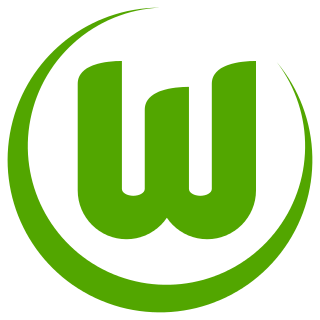
Verein für Leibesübungen Wolfsburg e. V., commonly known as VfL Wolfsburg or Wolfsburg, is a German professional sports club based in Wolfsburg, Lower Saxony. The club grew out of a multi-sports club for Volkswagen workers in the city of Wolfsburg. It is best known for its football department, but other departments include badminton, handball and athletics.

The DFL-Supercup or German Super Cup is a one-off football match in Germany that features the winners of the Bundesliga championship and the DFB-Pokal. The DFL-Supercup is run by the Deutsche Fußball Liga.

The 2008–09 Bundesliga was the 46th season of the Bundesliga, Germany's premier football league. The season began on 15 August 2008 with a 2–2 draw between defending champions Bayern Munich and Hamburger SV and ended with the last matches on 23 May 2009. VfL Wolfsburg secured their first national title in the last match after a 5–1 win at home against Werder Bremen.
The 2008–09 DFB-Pokal was the 66th season of the annual German football cup competition. The competition began with the first round on 7 August 2008, and ended with Werder Bremen defeating Bayer Leverkusen, who for their part eliminated defending champions Bayern Munich in the quarter-finals, in the final at the Olympiastadion, Berlin on 30 May 2009. The winners of the 2008–09 DFB-Pokal would qualify to the fourth qualifying round of the 2009–10 UEFA Europa League.
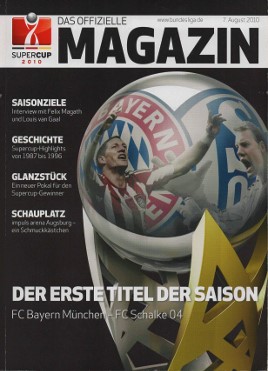
The 2010 DFL-Supercup marked the return of the German Supercup, an annual football match contested by the winners of the previous season's Bundesliga and DFB-Pokal competitions. The competition had not been played in an official capacity since 1996, and was replaced by the DFB Liga-Pokal from 1997 to 2007. For the previous two years, an unofficial super cup had been contested.

The 1994 DFB-Supercup, known as the Panasonic DFB-Supercup for sponsorship purposes, was the eighth DFB-Supercup, an annual football match contested by the winners of the previous season's Bundesliga and DFB-Pokal competitions.
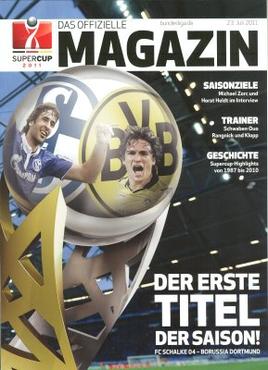
The 2011 DFL-Supercup was the second DFL-Supercup, an annual football match contested by the winners of the previous season's Bundesliga and DFB-Pokal competitions. It was a Revierderby between 2010–11 Bundesliga winners Borussia Dortmund, and 2010–11 DFB-Pokal winners Schalke 04. The match was played at Gelsenkirchen on 23 July 2011.

The 2014 DFL-Supercup was the fifth edition of the German Super Cup under the name DFL-Supercup, an annual football match contested by the winners of the previous season's Bundesliga and DFB-Pokal competitions. It featured Bayern Munich, winners of the 2013–14 Bundesliga, and Borussia Dortmund, the runners-up of the 2013–14 Bundesliga who also reached the 2014 DFB-Pokal final.
The 2015–16 DFB-Pokal was the 73rd season of the annual German football cup competition. Sixty-four teams participated in the competition, including all teams from the previous year's Bundesliga and the 2. Bundesliga. It began on 7 August 2015 with the first of six rounds and ended on 21 May 2016 with the final at the Olympiastadion in Berlin, a nominally neutral venue, which has hosted the final since 1985. The DFB-Pokal is considered the second-most important club title in German football after the Bundesliga championship. The DFB-Pokal is run by the German Football Association (DFB).

The 2015 DFL-Supercup was the sixth edition of the German Super Cup under the name DFL-Supercup, an annual football match contested by the winners of the previous season's Bundesliga and DFB-Pokal competitions. It featured Bayern Munich, the winners of the 2014–15 Bundesliga, and VfL Wolfsburg, the winners of the 2014–15 DFB-Pokal.

The 1988 DFB-Supercup was the second DFB-Supercup, an annual football match contested by the winners of the previous season's Bundesliga and DFB-Pokal competitions.

The 1977 German Supercup was an unofficial edition of the German Supercup, a football match contested by the winners of the previous season's Bundesliga and DFB-Pokal competitions.
The 1983 German Supercup was an unofficial edition of the German Supercup, a football match contested by the winners of the previous season's Bundesliga and DFB-Pokal competitions.
The 2008 German Supercup, known as the T-Home Supercup for sponsorship reasons, was an unofficial edition of the German Supercup, a football match contested by the winners of the previous season's Bundesliga and DFB-Pokal competitions.
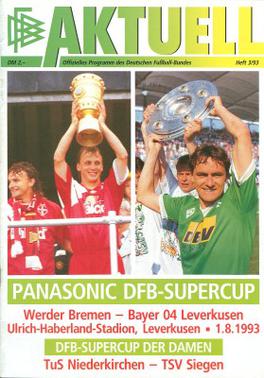
The 1993 DFB-Supercup, known as the Panasonic DFB-Supercup for sponsorship purposes, was the 7th DFB-Supercup, an annual football match contested by the winners of the previous season's Bundesliga and DFB-Pokal competitions.
The 2018–19 DFB-Pokal was the 76th season of the annual German football cup competition. Sixty-four teams participated in the competition, including all teams from the previous year's Bundesliga and the 2. Bundesliga. The competition began on 17 August 2018 with the first of six rounds and ended on 25 May 2019 with the final at the Olympiastadion in Berlin, a nominally neutral venue, which has hosted the final since 1985. The DFB-Pokal is considered the second-most important club title in German football after the Bundesliga championship. The DFB-Pokal is run by the German Football Association (DFB).

The 2018 DFL-Supercup was the ninth edition of the German super cup under the name DFL-Supercup, an annual football match contested by the winners of the previous season's Bundesliga and DFB-Pokal competitions. The match was played on 12 August 2018.

The 2020 DFL-Supercup was the eleventh edition of the German super cup under the name DFL-Supercup, an annual football match contested by the winners of the previous season's Bundesliga and DFB-Pokal competitions. The match was played on 30 September 2020. The match is usually played in July or August prior to the start of the Bundesliga. However, due to postponement of the 2019–20 Bundesliga as a result of the COVID-19 pandemic, the start of the 2020–21 season was delayed until September 2020. Due to the COVID-19 pandemic, the match was played behind closed doors.
The 2020–21 DFB-Pokal was the 78th season of the annual German football cup competition. Sixty-four teams participated in the competition, including all teams from the previous year's Bundesliga and 2. Bundesliga. The competition began on 11 September 2020 with the first of six rounds and ended on 13 May 2021 with the final at the Olympiastadion in Berlin, a nominally neutral venue, which has hosted the final since 1985. The competition was originally scheduled to begin on 14 August 2020 and conclude on 22 May 2021, though this was delayed due to postponement of the previous season as a result of the COVID-19 pandemic. The DFB-Pokal is considered the second-most important club title in German football after the Bundesliga championship. The DFB-Pokal is run by the German Football Association (DFB).
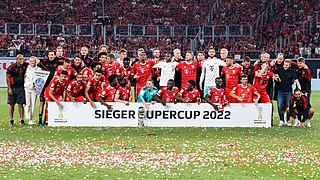
The 2022 DFL-Supercup was the 13th edition of the German super cup under the name DFL-Supercup, an annual football match contested by the winners of the previous season's Bundesliga and DFB-Pokal competitions. The match was played on 30 July 2022.